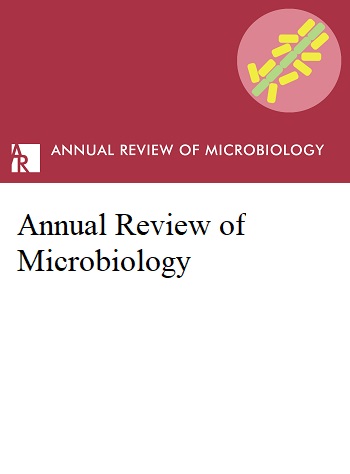III型分泌系统在根瘤菌-豆科植物共生中的多种作用。
IF 8.5
1区 生物学
Q1 MICROBIOLOGY
引用次数: 12
摘要
许多根瘤菌利用III型分泌系统(t3ss)在宿主细胞内传递效应蛋白(T3Es),以抑制植物免疫并促进细胞内感染,从而使豆科寄主受益。据报道,在病原体与寄主植物之间的相互作用中,豆科植物寄主的免疫系统和根瘤菌分泌的T3Es混合物决定了共生结果。如果它们未被发现,T3Es可能会降低植物的免疫力,从而促进根瘤菌对豆科植物的感染。如果一个或多个分泌的T3Es被同源植物受体识别,防御反应被触发,根瘤菌感染可能会中止。然而,一些根瘤菌T3Es也可以绕过结瘤(Nod)因子触发结瘤形成的需要。在这里,我们回顾了根瘤菌T3Es在与豆科植物的共生相互作用中所起的多方面作用。预计《微生物学年鉴》76卷的最终在线出版日期为2022年9月。修订后的估计数请参阅http://www.annualreviews.org/page/journal/pubdates。本文章由计算机程序翻译,如有差异,请以英文原文为准。
The Versatile Roles of Type III Secretion Systems in Rhizobia-Legume Symbioses.
To suppress plant immunity and promote the intracellular infection required for fixing nitrogen for the benefit of their legume hosts, many rhizobia use type III secretion systems (T3SSs) that deliver effector proteins (T3Es) inside host cells. As reported for interactions between pathogens and host plants, the immune system of legume hosts and the cocktail of T3Es secreted by rhizobia determine the symbiotic outcome. If they remain undetected, T3Es may reduce plant immunity and thus promote infection of legumes by rhizobia. If one or more of the secreted T3Es are recognized by the cognate plant receptors, defense responses are triggered and rhizobial infection may abort. However, some rhizobial T3Es can also circumvent the need for nodulation (Nod) factors to trigger nodule formation. Here we review the multifaceted roles played by rhizobial T3Es during symbiotic interactions with legumes. Expected final online publication date for the Annual Review of Microbiology, Volume 76 is September 2022. Please see http://www.annualreviews.org/page/journal/pubdates for revised estimates.
求助全文
通过发布文献求助,成功后即可免费获取论文全文。
去求助
来源期刊

Annual review of microbiology
生物-微生物学
CiteScore
18.10
自引率
0.00%
发文量
37
期刊介绍:
Annual Review of Microbiology is a Medical and Microbiology Journal and published by Annual Reviews Inc. The Annual Review of Microbiology, in publication since 1947, covers significant developments in the field of microbiology, encompassing bacteria, archaea, viruses, and unicellular eukaryotes. The current volume of this journal has been converted from gated to open access through Annual Reviews' Subscribe to Open program, with all articles published under a CC BY license. The Impact Factor of Annual Review of Microbiology is 10.242 (2024) Impact factor. The Annual Review of Microbiology Journal is Indexed with Pubmed, Scopus, UGC (University Grants Commission).
 求助内容:
求助内容: 应助结果提醒方式:
应助结果提醒方式:


